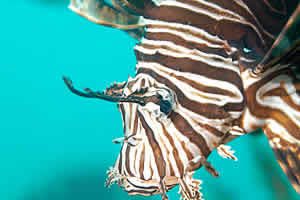
Florida officials are relaxing requirements for harvesting lionfish.
The Florida Fish and Wildlife Conservation Commission (FWC) announced changes to the lionfish harvest at a media event today in Coral Gables. Harvesting invasive lionfish no longer will require a fishing license when using certain gear, and there is no recreational or commercial bag limit.
The FWC is taking these actions to encourage more Floridians and visitors to harvest lionfish.
"The Florida Fish and Wildlife Conservation Commission hopes that by increasing the opportunity for people to harvest invasive lionfish, we can limit the impact this nonnative invasive species has on Florida's marine fish and wildlife," said Jessica McCawley, director of the FWC's Division of Marine Fisheries Management. "We also want to express our gratitude to everyone, especially divers, who already go out on a regular basis to harvest lionfish."
-
The changes, enacted by an executive order, apply only through August 2013. They are:
- A recreational fishing license is not required to target lionfish while using a pole spear, a Hawaiian sling (picture included in photo set), a handheld net or any spearing device that is specifically designed and marketed exclusively for lionfish.
- There is no recreational or commercial harvest bag limit for lionfish. The changes do not allow spearing in areas where spearfishing is prohibited and apply to state waters only, which is from shore to 9 miles in Gulf of Mexico waters and from shore to 3 miles in Atlantic waters.
Lionfish are a nonnative invasive species that threatens Florida's saltwater fish and wildlife. They prey on native fish and wildlife and can reduce native populations. Lionfish also compete for food with native predatory fish such as grouper and snapper. The FWC encourages people to remove lionfish in Florida waters to limit negative impacts to native fish and wildlife.
Lionfish have venomous spines, so the FWC urges careful handling. Unless a person is allergic to the venom, lionfish stings are rarely fatal. Anyone getting stung should immerse the wound in hot (not scalding) water or apply heat to the affected area for 30 to 90 minutes to help break down the toxin. Also, seek medical attention as soon as possible. Spearfishers should also take care not to damage the important reef habitat where lionfish often are found.
